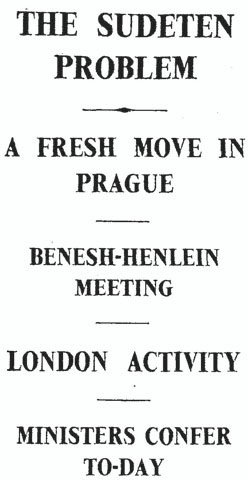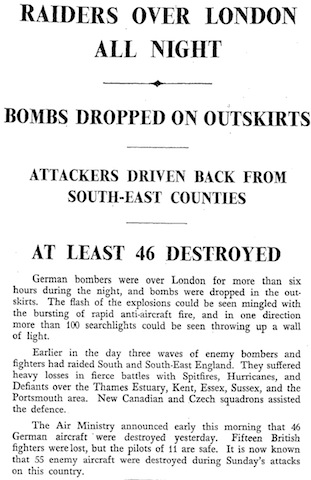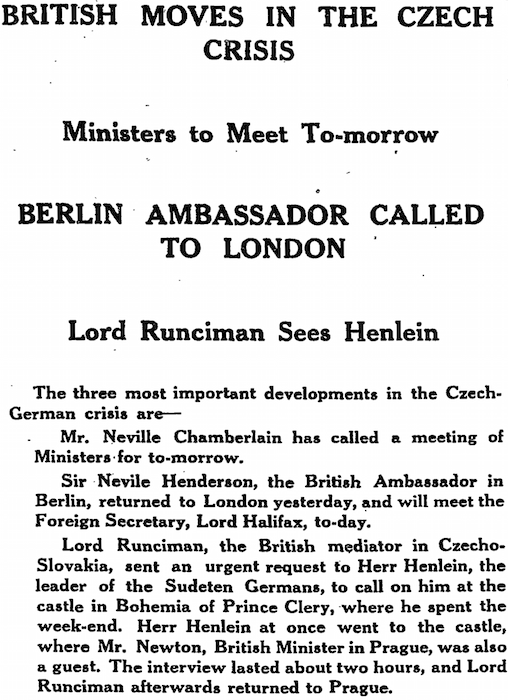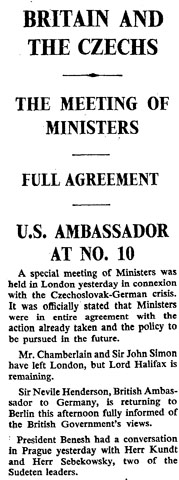
There is some hopeful news today, resulting from the flurry of activity of yesterday. From The Times, p. 10:
It became known in London late last night that, as the result of Lord Runciman’s intervention, Dr. Benesh, the President of the Czechoslovak Republic, will receive to-day Herr Henlein, the leader of the Sudeten Germans. It is likely that other Sudeten representatives will accompany Herr Henlein. The importance of the meeting is clear, and it may well decide whether or not the negotiations between the Czechoslovak Government and Herr Henlein’s party are to be resumed and on what basis.
So here we meet Dr. Edvard Beneš, President of Czechoslovakia since 1935, a very well-known and sympathetic character in the West: he had represented his country at the Paris Peace Conference in 1919, and been its foreign minister for most of the period since then. How fruitful this meeting will be depends on the good faith of Beneš and Henlein as much as their respective positions. But the French press is reported to be ‘more optimistic as to the prospect of an undisturbed autumn in consequence of this [British] activity’. The newspaper’s special correspondent in Prague says that there are no jingoistic feelings among the Sudetens themselves, who know they would bear the brunt of any war. Prague itself is very calm.
But there is still cause for uneasiness. The Berlin correspondent reports hostile feelings towards Britain: ‘Germans profess to be unable to understand why the British, who have long admitted the right to self-determination, should deny that right to the Sudeten Germans’. Hitler has toured his country’s fortifications on the French border, which are being ‘pushed forward at great speed’ by more than 400,000 labour conscripts, The Prague correspondent reports on his conversation with a fatalistic barber:
“Yes,” he said, “the situation is bad. Mind you, not only in Czechoslovakia — Spain, China, everywhere. But we are ready. A man can only die once, sooner or later.” I said I hoped it would be later. “Well,” he said, “we’ll see.”
The Manchester Guardian‘s London correspondent, p. 8, notes that Londoners, too, are becoming absorbed by the crisis, after initially having been ill-served by the ‘ostrich press’:
But this week one observes quite a different note in people’s voices when they discuss the threat to peace, and all conversations, personal or business, now turn in the end to that.
One question that is often asked is, why would Hitler bring this crisis to the brink of war if that would mean having to fight three ‘Great Powers’? (Presumably meaning Britain, France, and the Soviet Union.) And will the German people unite behind him if it does come to war?
The general reply given was that the German people, having hardly any access to objective news because of its Government press and wireless, can only know what they are allowed to hear, and in any case, if they do not like the dictator’s actions, how can they protest or even express doubts in the hearing of an informer?
There’s clearly an acute awareness here of the unfree nature of Nazi society, which is implicitly and unfavourably contrasted with Britain. Which is a little ironic given that when it came to foreign affairs, the British press was itself, in general, slavishly supportive of Chamberlain’s appeasement policy: even those newspapers which otherwise opposed him politically, such as the Labour Daily Herald and the Liberal Manchester Guardian itself. (See Richard Cockett, Twilight of Truth: Chamberlain, Appeasement and the Manipulation of the Press, London: Weidenfeld and Nicolson, 1989.) But this understanding doubtless motivated the hope of an (unfortunately unnamed) American journalist that if war did come, that ‘the first thing the other Powers would do would be to drop pamphlets all over Germany, telling the Germans why it was happening and what the issue was’ — exactly what was done just over a year later, although without any appreciable result as far as encouraging war resistance goes.
![]() This work is licensed under a Creative Commons Attribution-NonCommercial-NoDerivatives 4.0 International License.
Permissions beyond the scope of this license may be available at http://airminded.org/copyright/.
This work is licensed under a Creative Commons Attribution-NonCommercial-NoDerivatives 4.0 International License.
Permissions beyond the scope of this license may be available at http://airminded.org/copyright/.





Internet Explorer doesn’t load the image, but Firefox does, whyever.
Sorry about that, does it load in IE now?
Yes, now it’s ok, thanks!
Pingback: Airminded · Wednesday, 31 August 1938
Pingback: Airminded · Saturday, 3 September 1938
My family came from Czechslovaki and was told by a family member that I am related to Edvard Benesh. Would be interesting to learn more.